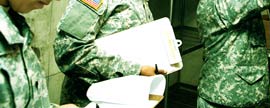I am working on getting you more regulatory references but I am not sure it will specifically answer this question. This is really a common sense issue. The SSG is probably correct.
When you attach a Soldier he is attached for 1 of 3 reasons:
- Admin, training, pay
- Training only
- TDY
When attached with “Admin” on their orders, the Soldier is attached with all administrative functions to be taken care of by the gaining unit including UCMJ, counseling, etc.
If this Soldier is an NCO the issue is specifically addressed in AR 623-3 para 3-49 which states the gaining unit handles the counseling:
3–49. Supervisor evaluations for temporary duty, special duty, or temporary change of station Rated Soldiers on TDY, SD, or TCS who are not responsible to their parent organization will be rated by their TDY, SD, or TCS supervisors according to rating chain requirements (see para 2–3 and 2–4). In these cases, the TDY, SD, or TCS supervisor is responsible for ensuring that a rating chain is published and that a DA Form 67–9–1 is initiated on the rated officer or DA Form 2166–8–1 is initiated on the rated NCO. TDY, SD or TCS supervisors are not authorized to render any type of evaluation report for periods of fewer than 90 calendar days unless otherwise authorized as an exception.
AR 27-10 para 3-8 states the gaining unit handles the counseling:
3–8. Persons on whom nonjudicial punishment may be imposed
a. Military personnel of a commander’s command. Unless such authority is limited or withheld by superior competent authority, a commander may impose punishment under UCMJ, Art. 15 on commissioned officers and other military personnel of a commander’s command, except cadets of the U.S. Military Academy (USMA).
(1) For the purpose of UCMJ, Art. 15, military personnel are considered to be “of the command” of a commander if they are—
(a) Assigned to an organization commanded by that commander.
(b) Affiliated with the command (by attachment, detail, or otherwise) under conditions, either expressed or implied, that indicate that the commander of the unit to which affiliated and the commander of the unit to which they are assigned are to exercise administrative or disciplinary authority over them.
So you cannot counsel a Soldier who is attached to another unit because he is attached for administrative action which includes counseling by the 1st line leader.
Now to satisfy your SFC you could simply do what we use to do for Soldiers who were on leave when we conducted monthly counseling. Simply write the counseling statement type in the purpose block: Performance Counseling for: “INSERT MONTH”. Then in the key points of discussion block type “Soldier attached to {INSERT UNIT} will continue counseling Soldier upon return to unit.”
I am not sure why he would want you to counsel this Soldier. A more appropriate action would be to place a Memorandum for Record in the Soldiers file that states, “Soldier attached to __________. Will counsel Soldier upon his return to the unit.”
If this Soldier has been a substandard performer in the past I would let this go or risk making it look like the chain of command is out to get the Soldier and then you and the SFC will have serious questions to answer.
If the SFC counsels you, consider the following actions. Initial disagree, write your rebuttal, and sign the document. Make sure you get a copy. If the SFC gets irate ask to see the 1SG/CDR on open door policy I am sure they will resolve the issue with common sense.














